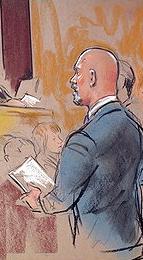How Kirschner Pushes Back the Miranda Charges
In a week from now, we may know the outcome of two of the defendants’ key pleadings before Judge Lynn Leibovitz; namely their motions to sever and hold three seperate trials and their motions to suppress their statements to MPD detectives from the night of the crime.
Leibovitz may rule (and scold) on both at the next status hearing on April 5.
A week ago we looked at the Motions to Sever. Based on little more than reading tea leaves, we guessed that since Joe Price defense counsel Bernie Grimm requested a larger hearing room to accommodate the full compliment of attorneys and staff at trial, Team Swann doesn’t appear confident that Leibovitz will rule in their favor. Again, just a guess.
Now, the Motions to Suppress. The defense contends 4th, 5th and 6th Amendment rights were violated when they were questioned by police on the night of Robert’s murder.
Simply put, they claim none of them were read their Miranda rights in a proper or timely manner.
Later this week we’ll look at a Government response, their Omnibus Opposition to Defendants’ Motion to Suppress Statements. But until we get a look at AUSA Glenn Kirschner’s reasoning and case law cited in his opposition, we’ll take our own shot at it.
Don’t take our word for it but Kirschner appears to be OK.
He showed his cards at the last status hearing, and may have at least one lonely, overlooked document sitting in the Superior Court Clerk’s office he might be able to wave around. More after the jump…
First the anecdotal: Up to now, the defense has never mentioned a violation of Miranda. A routine play like the failed motions to dismiss? Another Hail Mary after three and a half years? Maybe this is what ‘going through the motions’ means.
In Dylan Ward’s Motion for Pretrial Release and in press accounts, the MPD questioning of the defendants was characterized as “accusatory and threatening,” but with no mention of coercion. Was Ward forced to take that polygraph test at the FBI? Isn’t there an opt out for that?
The anecdotal aside, what else does Kirschner have? He tipped his hand at the January 15 status hearing while discussing MPD Detective Wagner’s reassignment out of the Homicide Department. Leibovitz questioned Kirschner on how might Wagner surface again in the trial:
Leibovitz: Will he be a witness?
Kirschner: He very well could be.
Leibovitz: At what? The trial?
Kirschner: (Regarding) the statements of the defendants (that Wagner witnessed). Originally we were told at an earlier status hearing that they were given voluntarily and in cooperation. Now they’ve moved to suppress them as involuntary.
OK, we’ll dig through transcripts. Kirchner then tells Leibovitz that Wagner could be a motions or merits witness. He sounded confident and there’s a document at the clerk’s office that may bear him out.
Last Spring saw wrangling over the civil suit; presiding Judge Brook Hedge stayed it until completion of the criminal case. But not before Kathy Wone’s attorney in that case, Covington and Burling’s Ben Razi filed a Consolidated Opposition to Defendants’ Motion to Stay and for a Protective Order and referred to a November 2008 document, Joe Price’s Motion for Release on Personal Recognizance.
On page 10, Razi quotes Bernie Grimm’s motion:
“In August 2006, Mr. Price cooperated with police and gave a voluntary statement regarding the death of his friend Robert Wone…”
So Kirschner has it on paper, at least as far as Price goes. But we’ve seen enough cut and paste jobs in this case to make us wonder if Ward and Zaborsky’s documents show the same language. Back to the clerk’s office.
–posted by Craig


Good memory eds.
Either they fully cooperated, or they didn’t.
And one must generally agree to take a lie detector test (though Joe/Schertler will no doubt argue that Dylan felt he was not free to leave unless he submitted).
HOYALOYA I agree on both counts. HOYALOYA/
CRAIG What do you think Kirschner means in saying that Wagner might be used as motions or a merits witness?
I have no clue. My wiki doesn’t go up that high. There’s never a lawyer around when you need one.
My quick take is that Wagner could be a witness with regard to the motions to supress, if necessary, (and perhaps if they are renewed at trial after being initially denied/?), to the effect that the statements he witnessed were given voluntarily. He could also be a witness as to the “merits” of the case, i.e. the primary case itself, not just the issue of admissibility of the statements.
HOYALOYA Thanks for the explanation.
In the above post, I love the artist’s rendering of Glenn, by the way. Editors, will we have similar portraits of the Four Horsemen or of the Three Stooges soon?